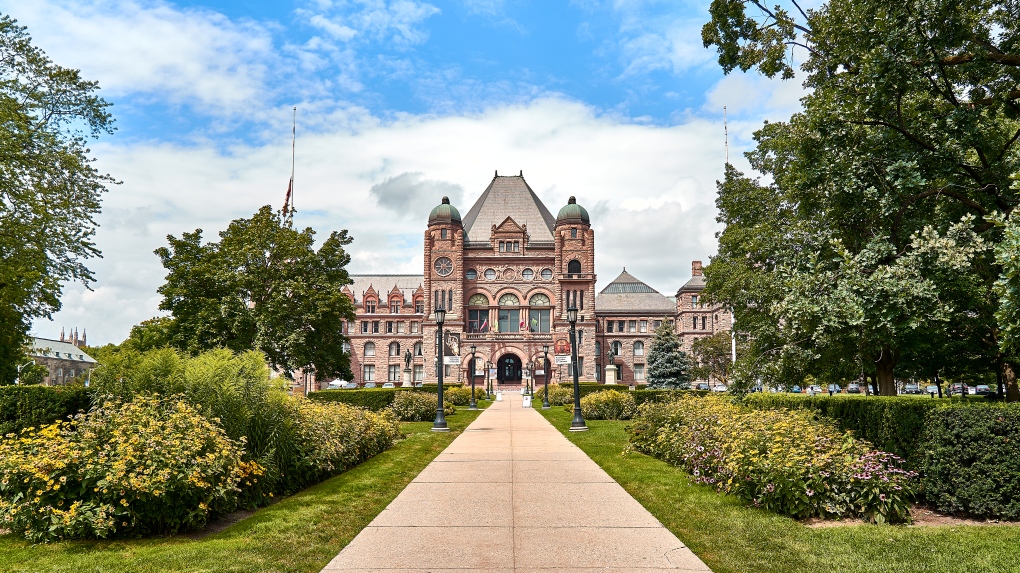Ontario records surplus in last fiscal year and a drop in education spending
 Queen's Park is seen in this undated photograph. (Craig Wadman)
Queen's Park is seen in this undated photograph. (Craig Wadman)
Ontario ended the last fiscal year with a $2.1-billion surplus, while it spent $1.4 billion less than planned in education.
The surplus is being used to help reduce Ontario's net debt, which is about $380 billion, and the government says it will pause an automatic pay increase legislators are supposed to get when there is a surplus.
Government officials say the surplus is a result of revenues that were 20 per cent higher than the 2021 budget forecast, largely due to higher-than-expected inflation and a "resilient" economy.
Actual government spending in the fiscal year that ended in March was $2.5 billion lower than the budget spending plan, including $1.4 billion lower in education, which officials say is partly due to the end of time-limited COVID-19 supports.
Health spending was higher than planned, mostly due to money that went to hospitals and long-term care homes to deal with the COVID-19 pandemic and on the vaccination strategy.
The government is also announcing that it is increasing the amount of money it will provide to parents in direct payment for tutoring supports from $225 million to $365 million, but still has not provided any details about how that program will work.
This report by The Canadian Press was first published Sept. 23, 2022.
CTVNews.ca Top Stories

B.C. tenants evicted for landlord's use after refusing large rent increase to take over neighbouring suite
Ashley Dickey and her mother rented part of the same Coquitlam duplex in three different decades under three different landlords.
Mountain guide dies after falling into a crevasse in Banff National Park
A man who fell into a crevasse while leading a backcountry ski group deep in the Canadian Rockies has died.
Expert warns of food consumption habits amid rising prices
A new survey by Dalhousie University's Agri-Food Analytics Lab asked Canadians about their food consumption habits amid rising prices.
MPP Sarah Jama asked to leave Ontario legislature for wearing keffiyeh
MPP Sarah Jama was asked to leave the Legislative Assembly of Ontario by House Speaker Ted Arnott on Thursday for wearing a keffiyeh, a garment which has been banned at Queen’s Park.
Charlie Woods, son of Tiger, shoots 81 in U.S. Open qualifier
Charlie Woods failed to advance in a U.S. Open local qualifying event Thursday, shooting a 9-over 81 at Legacy Golf & Tennis Club.
Ex-tabloid publisher testifies he scooped up possibly damaging tales to shield his old friend Trump
As Donald Trump was running for president in 2016, his old friend at the National Enquirer was scooping up potentially damaging stories about the candidate and paying out tens of thousands of dollars to keep them from the public eye.
Here's why provinces aren't following Saskatchewan's lead on the carbon tax home heating fight
After Prime Minister Justin Trudeau said the federal government would still send Canada Carbon Rebate cheques to Saskatchewan residents, despite Saskatchewan Premier Scott Moe's decision to stop collecting the carbon tax on natural gas or home heating, questions were raised about whether other provinces would follow suit. CTV News reached out across the country and here's what we found out.
Montreal actress calls Weinstein ruling 'discouraging' but not surprising
A Montreal actress, who has previously detailed incidents she had with disgraced Hollywood producer Harvey Weinstein, says a New York Court of Appeals decision overturning his 2020 rape conviction is 'discouraging' but not surprising.
Caleb Williams, Jayden Daniels and Drake Maye make it four NFL drafts with quarterbacks going 1-3
Caleb Williams is heading to the Windy City, aiming to become the franchise quarterback Chicago has sought for decades.

































